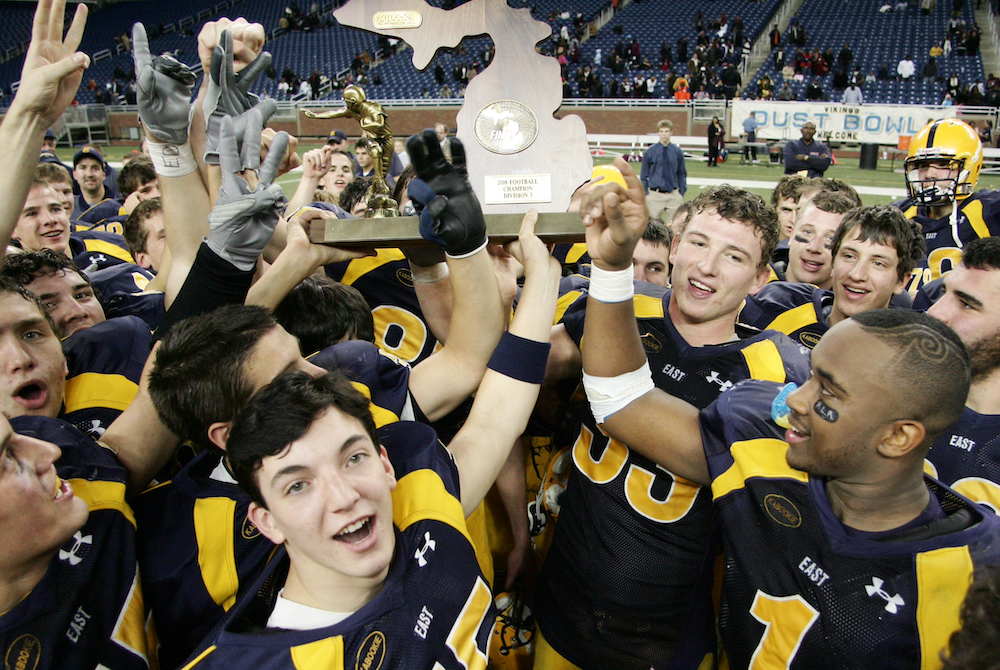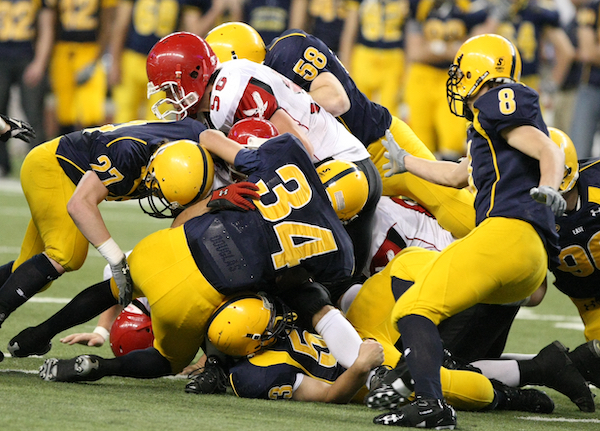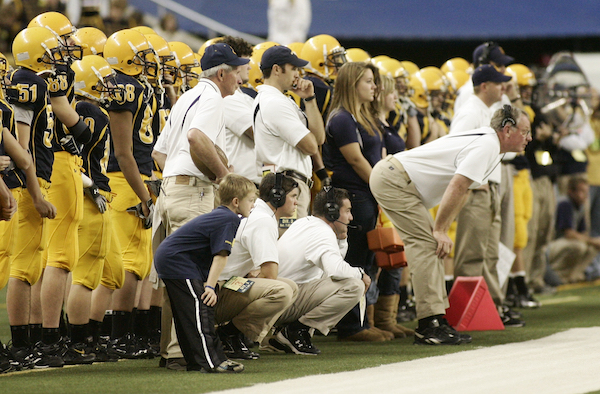
New Coach Takes Next Step at Escanaba
September 1, 2015
By Dennis Grall
Special for Second Half
ESCANABA – When school ended in early June, Dave Howes took a vacation trip to Florida and began thinking about his upcoming fourth season as junior varsity football coach at Escanaba High School.
Within a month he had become the school's varsity head coach, a position he had never thought about taking on.
 "To tell you the truth, I never wanted to be a head football coach," Howes said in the Eskymos’ lockerroom before the start of a recent practice. "It just kind of fell in my lap."
"To tell you the truth, I never wanted to be a head football coach," Howes said in the Eskymos’ lockerroom before the start of a recent practice. "It just kind of fell in my lap."
Escanaba had a 10-17 record over the last three seasons under previous coach Jim Hansen, who was dismissed in June, but opened this fall with a 21-7 win over Alpena on Thursday. The Eskymos travel to Petoskey on Friday.
When Howes was contacted about moving up from the jayvees, he said, "I had to make up my mind. Do I want it? It happened real fast. I wasn't expecting it. It just happened."
He was encouraged to apply by several people, including an Escanaba High School administrator, and was given the blessing of his wife, Holly, to pursue the position. He is the second coach in four years to direct the Eskymos, who during the previous 50 years had just two head coaches, Upper Peninsula Sports Hall of Fame inductees Jerry Cvengros and Dan Flynn.
When Howes first joined the Eskymos’ coaching staff in 2005, he said Flynn asked if he ever wanted to become the school's head coach. "I said, I don't know," said Howes. "I didn't envision it. Now I'm more than happy."
Howes said he has received excellent support from family, friends, players, coaches and the community during the short time he has been in charge.
"I want our fans to know that our kids are going to be competitive, and they are going to work hard. They will see there will be an edge about them," he said.
About 100 students came out for the three football levels, with 48 on varsity. Howes didn't have any preseason contact until after July 4, about a month behind the normal period. A big plus in the transition was all the previous assistant coaches stuck with the program, and they have all moved up a level in the process.
"They have all the kids they had in previous years, and we're running the same system," Howes said. "It has been an easy transition. Knowing the kids and knowing the coaches was easy. We had the same kids, the same coaches, the same philosophies. It's made practice easier."
 Athletic director Nick Nolde brought the coaches and players together and provided the introductions, which weren't really necessary because of the carry over. "It's been smooth sailing ever since," said Howes of the best-case scenario coming together.
Athletic director Nick Nolde brought the coaches and players together and provided the introductions, which weren't really necessary because of the carry over. "It's been smooth sailing ever since," said Howes of the best-case scenario coming together.
Nolde said given the way "everything went down, it has been a seamless transition. He is familiar with the kids, and he is familiar with the program."
Howes is a native of neighboring Gladstone, graduating in 1993 and playing against Escanaba teams in football, basketball and baseball. "It's weird. As a kid, I hated Escanaba with a passion. Now, here I am," said Howes, whose older brother Dave is an assistant varsity coach with former Escanaba player Don Koish and former Gladstone athlete Jason Micheau.
"It is so funny how things happen," said Howes, who also coached subvarsity football in Gladstone and Beal City following his 1998 graduation from Northern Michigan University and before coming to Escanaba in 2005.
He does not feel any pressure taking over the tradition-laden, highly-respected program spotlighted by the MHSAA Class A championship in 1981 and 1979 runner-up finish.
"To me, it is just a game and we're going to be competitive and try our hardest," Howes said. "We are moving forward. Every day we come in here and see the (old) pictures. It is a great tradition with great pride. But the focus is now. Everything is about the present."
He already has noticed the difference of being in charge of the whole program, from dealing with the news media to handling financial situations and MHSAA rules and regulations. "There is a lot more on my plate. Instead of being in charge of 30 kids, you are the boss of the whole program grades 7-12," he said.
He has also installed his own touch, starting with practice sessions. "The last couple of years we have had super-paced practices. This year we're doing more teaching in our practices," he said. "We are keeping it as simple as possible and putting kids in position to succeed. We're getting more done in a shorter amount of time."
He is not worried about matching X's and O's against such legendary Upper Peninsula coaches as Chris Hofer at Kingsford or Joe Noha from Menominee, nor is he concerned about the imprint made by Cvengros and Flynn, or even his high school coach, the highly-regarded John Mileski.
"I can't follow in their footsteps," he said. "They are irreplaceable. We've just got to move on."
 Denny Grall retired in 2012 after 39 years at the Escanaba Daily Press and four at the Green Bay Press-Gazette, plus 15 months for WLST radio in Escanaba; he served as the Daily Press sports editor from 1970-80 and again from 1984-2012. Grall was inducted into the Upper Peninsula Sports Hall of Fame in 2002 and serves as its executive secretary. E-mail him at [email protected] with story ideas for the Upper Peninsula.
Denny Grall retired in 2012 after 39 years at the Escanaba Daily Press and four at the Green Bay Press-Gazette, plus 15 months for WLST radio in Escanaba; he served as the Daily Press sports editor from 1970-80 and again from 1984-2012. Grall was inducted into the Upper Peninsula Sports Hall of Fame in 2002 and serves as its executive secretary. E-mail him at [email protected] with story ideas for the Upper Peninsula.
PHOTOS: (Top) Escanaba High School football coach Dave Howes makes a point to members of the Eskymos recently at Escanaba Athletic Field. Howes took over the tradition-laden program in July and is the second head coach in the past four years, after the late Jerry Cvengros and Dan Flynn served as the only head coaches during the previous 50 years. (Middle) Howes encourages his football team during a practice session.

EGR 5-Year Title Run Remains Awe-Inspiring, Product of More Than Talent Alone
By
Steve Vedder
Special for MHSAA.com
November 25, 2022
It was Peter Stuursma's first year at East Grand Rapids and while the wolves weren't necessarily knocking at the door, they were definitely on the prowl.
The tradition-rich Pioneers football team had slumped to an uncharacteristic 3-6 record in Stuursma's first season as varsity head coach in 2000, and there were subtle signs a community used to winning was growing restless with the program's direction.
That's when Stuursma bumped into one of his players coming out of the weight room, and the two had a quick conversation which he clearly remembers 22 years later.
"It was this senior offensive lineman and all he said was, 'Don't worry about it Coach, it's not going to happen again. We got this,’" Stuursma said. "We had just gone 3-6, and I'm wondering how we're going to get this going and that they might get rid of me. You never underestimate what people can do."
East Grand Rapids, under legendary coach George Barcheski, had been the dominant football program in West Michigan with 28 winning seasons over 29 from 1970-99, and 38 victories in 39 games from 1993-95, along with Class B championships in 1976 and 1983. After Stuursma replaced the retiring Barcheski,, some in the community were expecting more of the same when it came to success.
Those fans never dreamed what they would see as the Pioneers promptly pieced together arguably the greatest decade-long stretch in Michigan high school football history – and without doubt one of the most incredible five-year runs of dominance.
Even that optimistic offensive lineman couldn't have imagined a remarkable 126-7 record over the next 11 years, a 40-3 MHSAA Tournament mark and seven Finals championships. Five of those titles (2006-10) came in a row, a feat accomplished just three times in the now 46-year history of the playoffs.
 The five straight championships were part of an amazing era that Stuursma and his players say has not diminished with time. They recall no single factor explained going 67-3 overall over those five seasons. There was talent, obviously, but coaching, tradition, confidence and strength of community all played vital parts. There were Thanksgiving practices attended by hundreds of former football alumni, dedicated fan support that included playing before more than 30,000 fans at least twice at Ford Field, and a program-wide attitude that, while some may call it a cliché, proved that success did indeed breed success.
The five straight championships were part of an amazing era that Stuursma and his players say has not diminished with time. They recall no single factor explained going 67-3 overall over those five seasons. There was talent, obviously, but coaching, tradition, confidence and strength of community all played vital parts. There were Thanksgiving practices attended by hundreds of former football alumni, dedicated fan support that included playing before more than 30,000 fans at least twice at Ford Field, and a program-wide attitude that, while some may call it a cliché, proved that success did indeed breed success.
"I'm in awe of the scope of things," said Stuursma, whose team used back-to-back Division 3 championships in 2002-03 as a springboard to later success. "Because we had won a couple times before it just started to feel normal. We had such support the community used to think Thanksgiving break ended at Ford Field."
EGR teams would find all kinds of ways to win during the five-year title stretch. The 2009 team, for instance, barreled through its first four playoff opponents by a combined score of 164-29 until a 24-21 win over Orchard Lake St. Mary’s in the Final. The 2010 team had to win three playoff games by eight points or fewer to finish off its perfect 14-0 record. And then there was the wild 46-39 five-overtime win over St. Mary's in the 2007 Final during which the Pioneers had to score on all five possessions in overtime to outlast the Eaglets.
While teams always seemed to find ways to get the victory, former players remember what it was like to be part of a seemingly endless tradition of success on the football field.
"One of the things that was so special about East Grand Rapids were the expectations," said Luke Glendening, a running back on the 2006 team who has gone on to a long NHL career with the Detroit Red Wings and Dallas Stars. "During the game I'd look around and see guys who had played here a long time ago. I viewed it as a privilege to have the opportunity to play before the alumni and community."
Quarterback Ryan Elble, who completed a combined 34 passes for 483 yards and seven touchdowns during the 2008 and 2009 Finals, also used the word "honored" to describe his high school experience.
"The culture was to win. Coach Stuursma made it fun, and it always seemed to take shape on the field," said Elble, who went on to play baseball at Miami (Ohio) "I think each team had different skill sets, but at the end of the day it was our culture and putting in the work to spend Thanksgiving weekend at Ford Field."
The players point to that winning culture over talent. Elble said he played with only one eventual Division I college player in linebacker/running back Trent Voss, who went on to Toledo. Nobody wins without talent, of course, but they point to many other factors as being just as critical. Because EGR coaches would always work juniors into the lineup, Stuursma said the program faced only one major rebuild, in 2007. That team wound up 13-1 and the second of those five straight champions.
 "We had some incredible players," said Stuursma, who left EGR in 2016 to lead Hope College to two Michigan Intercollegiate Athletic Association titles, three second-place finishes and a 46-15 overall record over his seven seasons. "We returned only two starters (in 2007), but we still had good guys who wanted to win."
"We had some incredible players," said Stuursma, who left EGR in 2016 to lead Hope College to two Michigan Intercollegiate Athletic Association titles, three second-place finishes and a 46-15 overall record over his seven seasons. "We returned only two starters (in 2007), but we still had good guys who wanted to win."
The players say the culture started with Barcheski and the program's tradition. As Hope College's coach, Stuursma said there’s a similar common thread among schools he sees on recruiting visits: a winning tradition that, in Stuursma's words "screams excellence," from every corner of the building. He sees it the minute he walks into some schools, and East Grand Rapids had the same culture before he arrived. The past players say it played a major part in their careers.
That tradition didn't start with the five straight titles, said former quarterback Kyle Cunningham, who played on the 2002-03 teams and went 46-0 over four years from his freshman to senior seasons. Those two championship teams’ most recognizable player was running back Kevin Grady, who still holds multiple MHSAA records including for career rush yardage and went on to play at University of Michigan.
"We worked hard and had a lot of pride," he said. "I remember watching film of earlier teams, and I remember hoping our team could stand up the same way."
While the players point to tradition and community, Ryan Blair, a tight end/defensive tackle on the 2006-08 champion clubs, said talent remained critical – but EGR was outmanned physically in some of those title games. That's when camaraderie and the confidence that someone was going to make a key play took over. The Pioneers' remarkable run was teeming with such plays.
"Certainly we were never one of the biggest teams there, we never had a big size advantage in any game," he said. "But we had this camaraderie on every team. We had guys who really liked playing with each other. When things got tight we stuck together, and we'd fight to the fourth quarter or beyond."
Despite the long odds of winning a single state title let alone repeating, Stuursma believes there could be a team one day which wins six straight. That team will have the same characteristics of those EGR teams – the talent, coaching, tradition and fortune of catching timely breaks – but it can be done, he said.
"Absolutely," Stuursma said. "The only record I can think of that won't be broken is Wayne Gretzky's (NHL) scoring record. It will take a lot, but records are made to be broken. I think high school football is on the upswing and there would have to be an emphasis on winning. You would have to have a good path to get there, but I can see someone getting six one day."
PHOTOS (Top) East Grand Rapids celebrates its third-straight Division 3 championship win in 2008. (Middle) Pioneers converge on an Orchard Lake St. Mary’s ball carrier during the 2007 five-overtime title decider. (Below) EGR coach Peter Stuursma, kneeling center, monitors the action during the 2010 championship game.

